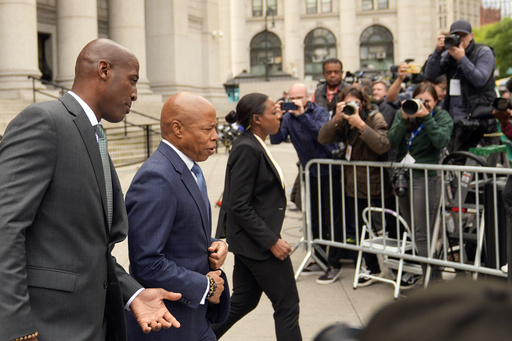
NEW YORK – Mayor Eric Adams of New York City recently received a significant reprieve when the federal government announced the dismissal of corruption charges against him. This unexpected decision signifies a break from the standard practices typically followed in federal prosecutions. Nevertheless, it seemed somewhat anticipated due to the ongoing political negotiations and interactions between Adams, a Democrat, and Republican figures, including the Trump administration.
The Justice Department directed prosecutors on Monday to dismiss the bribery-related charges without proceeding to trial, which was initially due to commence in April. Acting Deputy Attorney General Emil Bove issued a brief memorandum instructing the New York prosecutors to halt the case. Additionally, he requested that the investigation regarding the mayor’s conduct be paused until after the upcoming November elections, with an option to revisit the situation afterwards.
Bove maintained in his memo that the decision to terminate the charges was not influenced by the evidence or the integrity of the prosecutors involved. Instead, he cited that the ongoing legal proceedings were interfering with Adams’ campaign efforts for reelection and detracting from the support needed to address initiatives endorsed by the current administration, notably those related to immigration and public safety.
Dropping charges against a public official is quite unusual, especially for a case involving allegations as serious as those against a sitting mayor. Although cases against elected officials have collapsed in the past, typically due to weak evidence, it’s rare for cases to be dismissed simply because of the political affiliations of the accused, as highlighted by the acting deputy attorney general’s reasoning.
While the crisis may appear resolved, the situation isn’t completely over. The formal dismissal allows for the possibility of charges to be reinstated later on, depending on developments following the mayoral elections. Notably, Adams would have to consent in writing to this condition, leading to concerns from his critics that he may be pressured to align with Trump’s expectations should he continue his tenure as mayor.
The allegations against Adams date back to September when he was indicted on several charges, including conspiracy and bribery, connected to accepting unauthorized campaign contributions and extravagant overseas travel while serving as a public figure in Brooklyn and during his campaign. Prosecutors alleged that he facilitated favors for both international officials and local business interests in exchange for these benefits, such as expediting approvals for the Turkish consulate’s operations.
The fate of others implicated in the investigation remains unclear. Recently, a key figure, Mohamed Bahi, Adams’ liaison to the Muslim community, intended to plead guilty to charges involving campaign fundraising misconduct. Additionally, a prominent real estate developer admitted guilt for his role in directing unlawful donations to Adams’ campaign.
Moving forward, Mayor Adams faces an arduous path as he transitions from dealing with federal allegations to participating in a challenging reelection campaign. He is expected to contend with at least eight opponents, many of whom hold more progressive views. These include current and former city finance officers and several newcomers to the political arena. Notably, former Governor Andrew Cuomo is also considering a possible candidacy despite his controversial past.
Adams has not ruled out a return to the Republican Party, having previously registered as a Republican from the 1990s into the early 2000s. He recently attended Trump’s inauguration and met with key Republican figures in Washington. Moreover, he has reassured his administration’s compliance with Trump’s agenda regarding immigration and has refrained from critiquing the president and his policies publicly.

